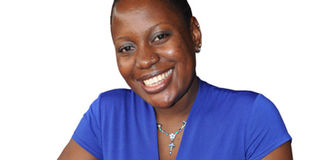Prime
‘Training urban slum youth has given me self-fulfilment’

Noeline Kirabo, the executive director of Kalerwe Youth Urban Slums. PHOTOS BY Rachel Mabala
What you need to know:
Teacher. Noeline Kirabo is the executive director of Kyusa, an organisation that provides soft employment skills to young people in urban slums. She spoke to Gillian Nantume about her work.
What kind of work are you engaged in?
My organisation, Kalerwe Youth Urban Slums (Kyusa), enrols youth from slums between the age of 15 to 25 to teach them soft employment skills that even helped them start their own business ventures. Most of them are school drop-outs. They study on funds which they pay back when they start earning.
What are these soft employment skills?
Our students decide on what they want to learn, instead of us providing tailor-made courses. Entrepreneurship, ICT, and employment skills are our core courses, so once they learn how to use the computer, they can study any online course. We also link them to mentors who are in the working field, which boosts their confidence and competence.
Why do you think teenage pregnancies and child marriages still persist today?
Most NGOs are doing treatment programmes. They treat the problem but do not offer preventative measures. Many deal with the youth and forget the most important person; the caretaker.
You may communicate with these children but when they go home, the caretaker does not understand the challenges they face as teenagers.
If we can have community intervention programmes that target the caretakers, there will be results because teenagers look up to their elders.
Why the urban slums?
I grew up in Old Kampala, which is an urban slum. I know how crippling and limiting life in a slum can be. You grow up hearing and believing that you cannot amount to anything.
We were told that if we reached Senior Six, we would be lucky. I decided that I did not want to remain in that position. I had big dreams and would not be put down.
When I started Kyusa, it was a way of going back to my roots and working with people I could identify with.
Why this particular line of work?
I was searching for fulfilment. I had been in formal employment and I felt there was no more challenge for me. I thought there must be more to life besides getting money and building houses.
Have you always loved working with people?
Raised by a single mother, in 2000 when I was in Senior Six, she was diagnosed with cervical cancer. She stopped working and all of us dropped out of school. I nursed her for one year until she pulled through. During that time I learnt that life was all about choices.
I developed a reading culture by hanging out at the public library on Buganda Road, and later took as many online courses as I could.
My first job was in psychosocial support with ECCA where we worked with children and communities against abuse.
Later, when I resigned from Viva Network, I began using my life experiences to inspire youth with talks I gave in churches and schools.
I did not have a plan yet so when I got a scholarship to study Social Entrepreneurship at Kanthari International in India in 2013, I took it.
When I came back, giving back to the community through Kyusa was the only way I felt fulfilled.
What have been your achievements?
We have been around for a year and 80 per cent of our alumni are employed with an average monthly income of Shs150,000. Forty per cent of those who started their own ventures are employing at least one person.
We have received international recognition for our efforts. Last year, we won The Dewey Winburne Community Service Award in Austin, Texas. Rotary Vijan Por is launching a programme that is similar to ours and we designed their curriculum and trained their facilitators.
We have also partnered with The Mandela Washington Fellowship Programme and are hosting their fellows in Kyusa.
How can a woman catch up with her dreams?
Life gets so busy and routine that a woman must take time to think about herself. We all have personal dreams but it is easy to lose sight of them in your marriage and work.
Once your dreams are clear to you, you have to have the courage to step out of a secure job and follow your passion. For me, funding was a challenge in the beginning, because I had a passion but I realised I needed money to fund that passion. You can start small, getting help from your network of friends.
Go for win-win relationships. For example, our first class was in a room provided by a friend, and in return I did his documentation.
Titbits
What would I find in your bag?
My diary, phone, notebook and a tablet for reading when I am stuck somewhere.
No makeup?
I am not really girly. I was a tomboy until about two years ago when I brought dresses and high heels. I was a jeans person but I realised I have to adapt to the community expectations of me.
What outfits enable you to strike the perfect image?
I am more into flat shoes, but I am catching up with heels, especially wedges and can wear them on any outfit. I would wear a knee length dress and high heels for dinner, though.
Your ideal leisure activity
I love swimming, watching moving and catching up with friends. Reading is a hobby too.
Who do you look up to?
Michelle Obama. She is strong, fierce, and unstoppable. Plus, I love her style and approach to life.
Tell us about your childhood
I am the last born of three, one brother and one sister. I went to Bat Valley Primary School, Wanyange Girls School, and Nnalinya Lwantale School and Kampala High School for my A-Level.




